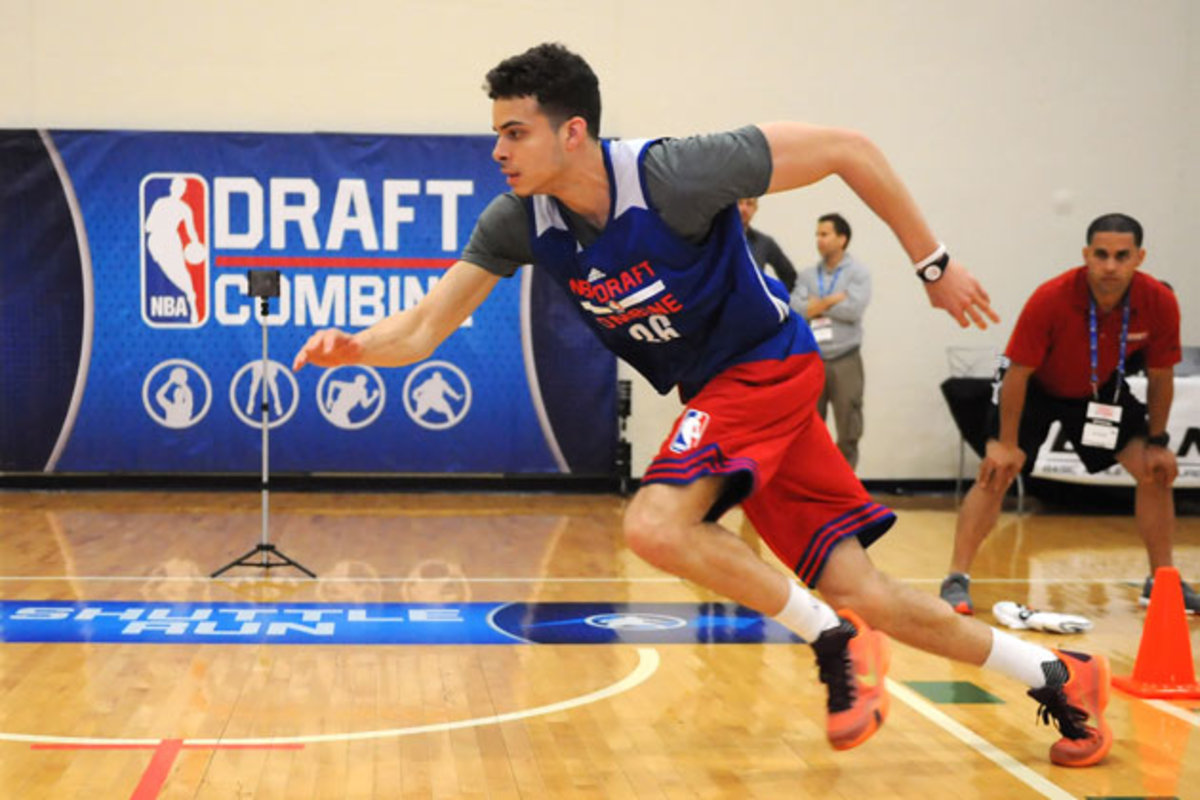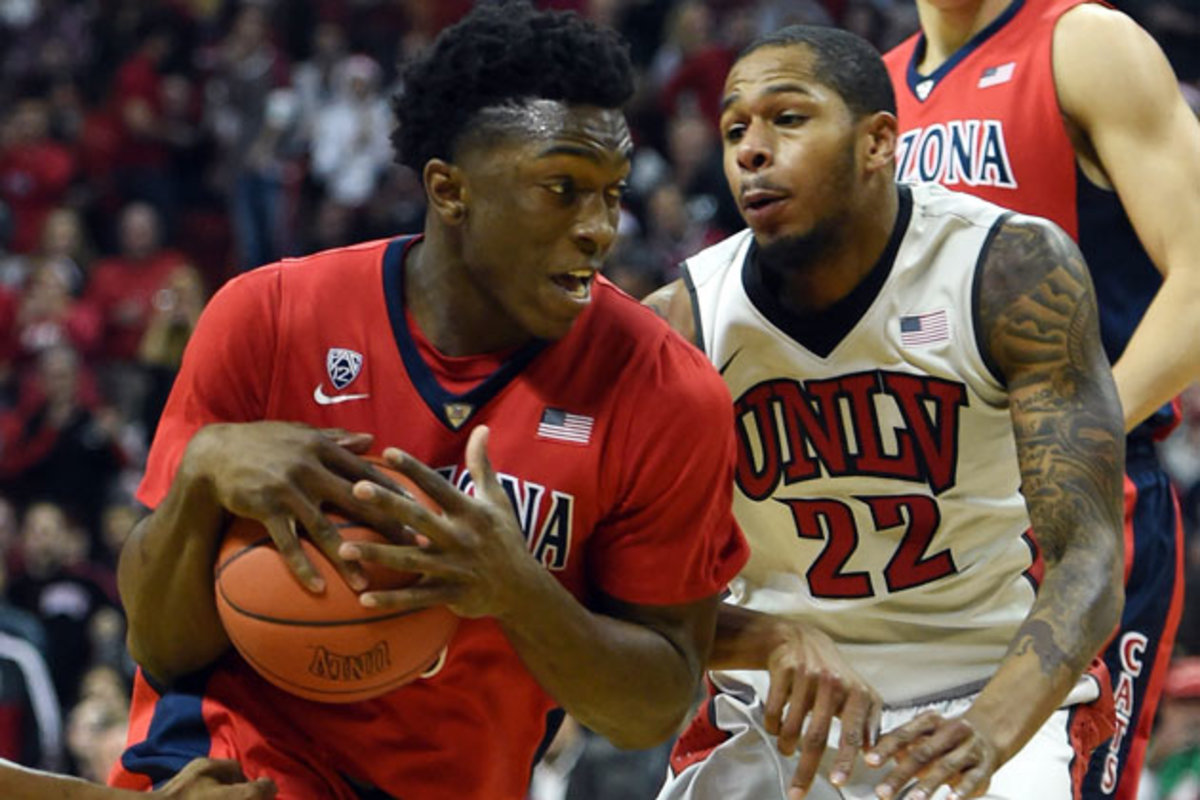Notebook: Top storylines and rumors from the 2015 NBA draft combine

CHICAGO—D’Angelo Russell will readily admit it. A year ago, he never expected to be here. Not as a decent prospect—Russell was ranked No. 18 by Rivals.com coming out of high school—who operated in the shadows of so many more. Not as Ohio State's sidekick the first few games of the season. Not as a stringy, 6’5” guard few believed could play the point.
“I unpacked my bags [at Ohio State] and figured I would be there for a long time,” Russell said at last week's NBA draft combine. “I was always a guy who was overshadowed by great players. I honestly thought I would be a four-year player. I didn’t think my body would be right. I didn’t think I had the skill or the knowledge.”
After one season in Columbus—where Russell averaged 19.3 points, 5.7 rebounds and 5.0 assists, packed on 10 pounds of muscle and dazzled scouts with his uncanny passing ability—Russell’s opinion about his place among the top players has changed. Significantly.
Said Russell, “I’m the best player in the draft.”
Here’s what executives love about Russell: His passing. Russell has superior size, but it’s his ability to read defenses that stands out. Russell averaged 2.9 turnovers per game last season. Study the tape though, and watch how many picture-perfect fastballs bounced off teammates' hands because they weren’t expecting them. Russell’s greatest strength is seeing a play develop before it happens.
“If I see a guy running and a guy is not paying attention, I know he is going to be open,” Russell said. “I’m waiting for him to make eye contact with me, or he’s going to get hit in the head.”
2015 NBA Mock Draft 1.0: Battle for No. 1 begins between Towns, Okafor
Indeed, for every executive that questions Russell’s athleticism, there is another that dismisses it as a non-issue. One Eastern Conference exec called athleticism, “the most overvalued attribute in the draft.” Another exec said Russell’s intelligence would make up for any deficiency. One assistant coach cited Warriors guard Stephen Curry. As a rookie, Curry’s defensive issues at the NBA’s summer league terrified Golden State coaches. In time, Curry has developed into a solid defender. And a decent offensive player, too.
Ironically, Russell sees Curry as his closest comparison.
"I don't want to sound like I'm overdoing it since he's the MVP of the league," Russell said. "But when I watch his game, I see myself. The plays he makes, the shots he takes, and passes he makes, I see it before it even happens. I feel like that's what separates me from a lot.”
When asked about his position on the floor, Russell says he is a basketball player. “I can dribble like a point guard and score like a two,” Russell said. But he is clear: Point guard is where he wants to play. He understands the skeptics. Again, nothing new.
“I was always told, if anyone asks, tell them you’re a point guard,” Russell said. “But I’m a do everything type of player. Passing, scoring; I know I have the capability of doing it. Whatever a coach needs. I don’t know if [NBA teams] think I’m a point guard. But I can play it.”
Russell is not expected to go No. 1 next month—that honor is likely to fall to Kentucky’s Karl-Anthony Towns or Duke’s Jahlil Okafor, neither of who appeared at the combine. Russell says he should go first, but he’s OK with falling, so long as he falls to a team he believes is the right fit.
“It would be a blessing to be No. 1 but I want to go somewhere where I know I will stick,” Russell said. “Where I can help build a legacy. If that means going eighth, I’d prefer that, honestly. It may sound [crazy], but I’d rather be a guy who is a superstar for one team than a guy that bounces around.”

R.J. Hunter makes an easy decision
Statistically, R.J. Hunter’s junior season at Georgia State was a disappointment. He shot 39.5% from the floor, down from 44.4% as a sophomore; he shot 30.5% from three, a free fall from the 39.5% he shot the year before. Even his free throw shooting (87.8%) dipped a tick.
Those numbers might be motivation for a player to return for his senior season. For Hunter, it was just the opposite.
“I think about the middle of the season I knew I was going to go [to the NBA],” Hunter said. “How I was being defended, I was seeing two bodies a shot. I wasn’t getting open looks. I was getting out of my game. A lot of time I was flicking shots instead of following through. That’s why my shots were so short.”
2015 NBA Common Sense Mock Draft: Projecting first round on need and fit
NBA executives agree. When asked about Hunter’s low numbers, several execs said they believe Hunter will thrive in a less spotlighted role. There are concerns—defense and Hunter’s spindly lower body are the most commonly mentioned—but few doubt his ability to be a consistent perimeter threat.
Hunter is easy to like. He’s engaging. One minute he’s joking about Tinder (“I downloaded it and then deleted it,” Hunter said), the next kidding about Houston telling him they were “getting rid of James Harden” for him, the next revealing that Golden State told him they liked him because they needed more shooting.”
“Backup shooting,” Hunter clarified, laughing.
Hunter is clear about one thing: When it comes to leaving Georgia State, he and his father, Ron, the Panthers head coach, were on the same page. It would be logical to think that Ron Hunter might be conflicted about losing his best player, especially when there was enough reason for him to stay another year. Not so, says R.J.
“He didn’t give me the hard sell,” Hunter said. “He gave me the sell to go for my dreams. It was an easy decision for me.”
Asked to cite a comparison—the most maddeningly oft asked question at the combine—Hunter flinched. He told reporters that he “hated comparisons,” preferring instead to focus on players who impacted the game.
“Klay Thompson is a two-way player,” Hunter said. “He’s not just a guy who makes shots. I like that. Kyle Korver, Ray Allen, Reggie Miller, they had a great feel for the game. I have that, too.”
The recent success of mid-major’s isn’t lost on Hunter, either. One, in particular, gave him a boost of confidence: Elfrid Payton, the Louisiana-Lafayette guard—and former Sun Belt conference rival—who was drafted No. 10 overall last season.
“He went from my archrival to best friend,” Hunter said. “From the Sun Belt to the NBA. That’s something.”

Can Stanley Johnson answer enough questions?
For Stanley Johnson, the Arizona freshman who didn’t declare for the draft until three days before the early entry deadline, the decision to leave school was particularly difficult.
“Coach [Sean] Miller, I feel like he created a monster,” Johnson said. “If I went back, I felt I would have had the season I wanted to have right away. The question you have to answer is ‘Are you ready for the league? When I answered that question yes, I knew it was time. You’re either 10 toes in or 10 toes out. I was 10 toes out, so I left.”
Jahlil Okafor, Myles Turner among NBA draft prospects worth debating
Johnson possesses an NBA body. He measured in at 6’6”, 241 pounds at the combine, with a 7.5% body fat. “I can carry 255,” Johnson said. “I’m a big boned dude. My parents are from the south.”
His other skills are a little murky. Johnson made 37.1% of his three’s last season, but he is not considered an especially good shooter. He made 44.1% of his shots last season, but scouts don’t love his ball handling and cite many scoring opportunities at Arizona where Johnson just overpowered people.
Still, Johnson believes he will surprise people. He cited his rapidly improved midrange game. He pointed to his versatility. He declared that few other players approached the game with his relentlessness.
“I can move all over the court,” Johnson said. “I can start a game at three, two or four. I can be the primary ballhandler in any pick-and-roll or any two-man situation. And on defense I’m going to play hard. I’m going to play smart and I’m a nasty competitor. I don’t think there’s many guys out there who want to compete as hard as I do.”
Tip-ins
• Myles Turner’s awkward gait—and the potential that it could indicate a long term health problem—was a topic that hit every college scouts report last season. To alleviate concerns, Turner’s agent, Andy Miller, sent Turner to New York’s Hospital for Special Surgery for a battery of tests. According to Turner, he received a clean bill of health.
• Ex-Washington center Robert Upshaw is a physical specimen. He measured in at 7’0”, 258 pounds with a 7’5” wingspan at the combine. And his shot blocking numbers last season—he averaged 4.5 blocks per game—are staggering. But Upshaw’s past—he was dismissed from Washington in January, just two years after being dismissed from Fresno State, for drug violations—is sticking to him. Several NBA executives said they wouldn’t touch Upshaw in the first round; the second round could be a stretch. Upshaw has hired a life coach and has been working out at the famed P3 gym in Santa Barbara. But it’s unlikely any team will guarantee him any money.
• The buzz around Russell: He will be very selective in who he works out for. Multiple executives believe Russell only intends to work out for the teams with the top three picks.
• The Oklahoma City head coaching job was believed to be between Florida’s Billy Donovan and UConn’s Kevin Ollie. Not so, per a source. The Thunder never approached Ollie about the job. Oklahoma City GM Sam Presti has enormous respect for Ollie, who was a member of the Thunder's roster before taking a job with the Huskies, but the team was locked in on Donovan from the start.
• Denver is in the early stages of its coaching search, but one thing is clear: The Nuggets want to play fast again. Alvin Gentry and Mike D’Antoni are believed to be on the team’s radar.
• A bit of a surprise: Multiple executives told me they believe Kentucky’s Devin Booker will go in the top 10. Booker, arguably the best shooter in the draft, was slotted at No. 14 in SI.com’s first mock draft. Another fast riser: Murray State’s Cameron Payne (No. 21) who has emerged as a strong lottery candidate.
• While the five-on-five scrimmages lacked star power, it did help a few players. Among the best performers, per multiple executives: Syracuse’s Rakeem Christmas, North Carolina’s J.P. Tokoto and LSU’s Jordan Mickey.
• Finally, a note to the NBA. While the combine is well run—hat tip to the NBA’s Joanna Shapiro, who does a terrific job coordinating player access—a suggestion: Before each availability, post which teams interviewed which players. It will eliminate the hundreds of questions from local reporters trying to find out which players interviewed for which teams. I’d also like to eliminate “Would you like to play for Team X,” “Who do you compare to” and “What’s your best NBA skill,” but hey, I’m not greedy.
